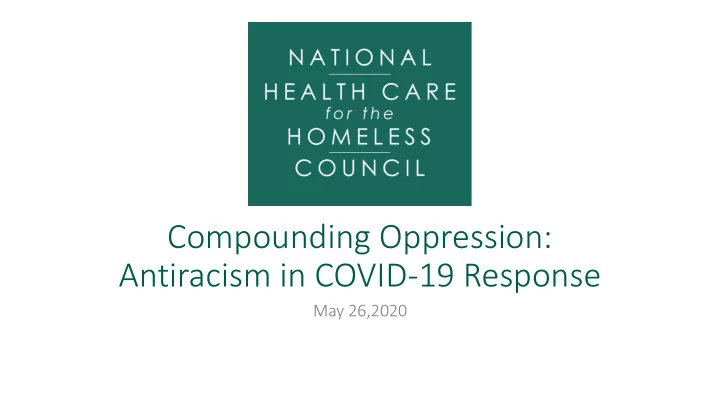

Compounding Oppression: Antiracism in COVID-19 Response May 26,2020
HRSA Disclaimer This resource is supported by the Health Resources and Services Administration (HRSA) of the US Department of Health and Human Services (HHS) as part of an award totaling $1,625,741, and zero percent (0%) financed with non- governmental sources. The contents are those of the author(s) and do not necessarily represent the official views of, nor an endorsement by, HRSA, HHS, or the US Government. For more information, please visit https://www.hrsa.gov
Panelists & Moderators • Tanya DeHoyos (she/her) Chief People Officer • Michael Durham (he/him) National Health Foundation: Los Angeles Technical Assistance • Shontel Lewis (she/her) Manager VP, Equity, Inclusion, and Diversity Colorado Coalition for the Homeless: Denver • Lauryn Berner (she/her) • Renata Robinson (she/her) Research Manager Chief Human Resources Officer Colorado Coalition for the Homeless: Denver National Health Care for • Linda Son-Stone the Homeless Council: Chief Executive Officer First Nations Community Healthsource: Albuquerque Nashville • Sonja Spears (she/her) Chief Equity & Inclusion Officer Boston Health Care for the Homeless Program: Boston
Polls • What kind of organization are you with? • Respond to this statement: my organization has been conscious, proactive, and consistent about racial equity during this pandemic.
Why we’re talking about this • We are witnessing disturbing, though not surprising, disparities and discrimination. • We were already in a crisis of racism, specifically in the housing and health care industries. COVID-19 is exacerbating these existing crises. • Institutional antiracism is more important than ever during a crisis. And if it’s not the priority now, it never really was. • The Council’s work on racial equity to date provides helpful lessons for the pandemic.
National Health Foundation Recuperative Care Centers -2 sites within LA, 1 in Ventura County -92 bed Pop-up City/County/FEMA shelter JEDI during COVID-19 Lead with the welfare of our staff. Ask. -Crisis Pay -Sick Time Flexibility -Uber Credits for Public Transportation users -Lunches/Dinners during shift -Care packages & stipend for those WFH -Promoting self-care Consider the same for our guests. Ask.
Boston Health Care for the Homeless Program Primary care, respite care, behavioral health, dental, Webinar on COVID and Early COVID demographic data pediatric care, women’s Limited English proficiency structural vulnerability by Dr. collection heavily dependent on health clinic, immigrant health supports added to COVID Jen Brody and Sonja Spears state and city government with clinic, transgender program response areas. presented to med school poor tracking initially. for approx. 11,000 annually. seniors. Approx. 600 staff Board member Dr. Thea James Medical Director, Dr. Denise De Mutual aid fund- brainchild of appointed to panel to review Las Nueces appointed to state Equity and Social Justice and advise on critical standards panel to improve health equity Committee co-chair Phil Stango. of care, resulting in successful in Massachusetts. modifications.
Shontel Lewis, VP, EID Renata Robinson, CHRO COLORADO COALITION FOR THE HOMELESS
Role of Racial Justice (COVID 19) Recognizing in any response – Need to include racial justice lens Population we serve – Disparities Racism within our culture Testing Frontline staff – PPE Leadership Health Care Choices
First Nations Community HealthSource • New Mexico’s Urban Indian Health Center; one of 44 Urban Indian Health Programs • Core services: Medical, Dental, Behavioral Health, Cultural Wellness/Traditional Healing • Mission: To provide a comprehensive and culturally appropriate health delivery system that addresses the physical, social, emotional, and spiritual needs of urban Indians and other underserved populations in Albuquerque and the surrounding areas. • Racial Disparities in COVID-19 Crisis • Historical inequities in health care funding have contributed to the health disparities that place Indigenous people at high risk for COVID-19 • High mortality rates among American Indians due to COVID -19 due to high rates of pre- existing conditions and lower access to care.
Discussion
Additional Resources • Webinar this Friday, May 29: Consumer Perspectives of Isolation and Quarantine • All webinars in the COVID-19 series archived online • Newly redesigned COVID-19 resource page • Antiracism resource page • Get in touch: mdurham@nhchc.org
Recommend
More recommend